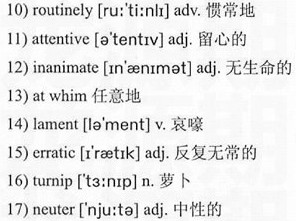俗语说:“病从口入,祸从口出”。语言的力量有多大?你可以因为别人一句话而怒不可遏,也可以因为别人一句话而心花怒放。你的心情真的会因为别人有心或无意的话语而起伏不定。那么,有没有人想过,我们的思维方式很大程度上是由我们所说的语言决定吗?有人说,法国人浪漫,德国人务实,这只是一种民族性情吗?还是说他们的语言在决定着他们的个性和思考方向呢?
东方人对蓝眼睛有着别样的着迷,而西方人对黑发怀着另类的欣赏,东西方之间的交流远远不是大眼对小眼,微笑加拥抱就能解决的;更多是在语言学习的基础上,对他人的思维方式和文化习惯有了认识和了解之后,交流才得以向前迈进一步。
我说故我想?这不无道理。 ——Mac
文字难度:★★★☆

Seventy years ago, in 1940, a popular science magazine published a short article that set in motion one of the trendiest intellectual 1)fads of the 20th century. The author, Benjamin Lee Whorf 2)let loose an 3)alluring idea about language’s power over the mind, and his 4)stirring prose seduced a whole generation into believing that our mother tongue restricts what we are able to think.
七十年前,也就是在1940年,当时一本流行的科学杂志上刊登了一篇短文,这篇文章掀起了堪称20世纪最为流行的思潮之一。文章的作者本杰明·李·沃尔夫给出了“语言掌控思想”这一有趣的观点,他那篇引起轰动的文章诱使整整一代人对“我们的母语限制了我们的思考能力”这一看法信奉不已。
Whorf, we now know, made many mistakes. The most serious one was to assume that our mother tongue constrains our minds and prevents us from being able to think certain thoughts. Since there is no evidence that any language forbids its speakers to think anything, we must look in an entirely different direction to discover how our mother tongue really does shape our experience of the world. Some 50 years ago, the renowned 5)linguist Roman Jakobson pointed out a crucial fact about differences between languages in a 6)pithy 7)maxim: “Languages differ essentially in what they must convey and not in what they may convey.” This maxim offers us the key to unlocking the real force of the mother tongue: if different languages influence our minds in different ways, this is not because of what our language allows us to think but rather because of what it habitually8)obliges us to think about.
如今我们已经知道,沃尔夫的看法存在很多谬误。而其中最为严重的错误是假定我们的母语束缚了我们的思考,阻碍我们形成对某些想法进行思考的能力。既然没有任何证据表明有一种语言妨碍了该语言使用人群的思考,那我们就必须从一个全新的视角去了解母语究竟是如何塑造我们对这个世界的感受体验的。五十多年前,著名的语言学家罗曼·雅各布森就言简意赅地指出存在于语言差异的一个关键事实:“语言之间的根本差异在于其必须要表达的,而并非其能表达的。”这个原则是我们了解母语的真正影响力的关键,那就是,如果说不同的语言以不同的方式对我们的思维造成影响,那并不是因为我们的语言对我们的思考范围设了限制,而是因为这一语言习惯性地迫使我们去思考某些特定的内容。
Consider this example. Suppose I say to you in English that “I spent yesterday evening with a neighbor.” You may well wonder whether my companion was male or female, but I have the right to tell you politely that it’s none of your business. But if we were speaking French or German, I wouldn’t have the privilege to 9)equivocate in this way, because I would be obliged by the grammar of language to choose between voisin or voisine; Nachbar or Nachbarin. These languages compel me to inform you about the sex of my companion whether or not I feel it is remotely your concern. This does not mean, of course, that English speakers are unable to understand the differences between evenings spent with male or female neighbors, but it does mean that they do not have to consider the sexes each time they come up in a conversation, whereas speakers of some languages are obliged to do so.
我们来看看这样一个例子。假设我用英语说“昨晚我跟我的邻居在一起。”你可能会很想知道我的同伴究竟是男还是女,但我可以客气地告诉你,这与你无关。可如果我们双方都讲法语或德语,那我就没有办法在这一点上含糊其词,因为这两种语言的语法规定我不是说voisin(法语,“男邻居”)就是说voisine(法语,“女邻居”),或Nachbar(德语,“男邻居”)或Nachbarin(德语,“女邻居”)。无论我觉得这事与你有没有关系,这两种语言都迫使我告诉你我同伴的性别。当然,这并不表明说英语的人没有能力搞清楚与自己夜聚相伴的是男还是女,只不过表明了他们在谈话的时候,并不需要考虑性别这个因素,而有些语言则要求它的使用者得这么做。
On the other hand, English does oblige you to specify certain types of information that can be left to the context in other languages. If I want to tell you in English about a dinner with my neighbor, I may not have to mention the neighbor’s sex, but I do have to tell you something about the timing of the event: I have to decide whether we dined, have been dining, are dining, will be dining and so on. Chinese, on the other hand, does not oblige its speakers to specify the exact time of the action in this way, because the same verb form can be used for past, present or future actions. Again, this does not mean that the Chinese are unable to understand the concept of time. But it does mean they are not obliged to think about timing whenever they describe an action.
另一方面,在某些语言里可以凭借语境意会的隐含信息,换到英语里则必须明言表达。如果我要用英语告诉你我与邻居吃晚饭这个事,我可以不提及邻居的性别,但我必须告诉你此事发生的时间:我得选好用词时态,是用“dined”(吃过晚饭)、“have been dining”(一直在吃晚饭)、“are dining”(正在吃晚饭),还是“will be dining”(将会一起吃晚饭)等等。但汉语则不要求它的使用者以这种方式把时间准确地表达出来,因为汉语的同一个动词形式可以用来表达过去、现在或将来的行动。同样,这并不意味着汉语的使用人群不明白时间的概念,但它意味着他们在描述一个行为时,不一定要考虑时间问题。
When your language 10)routinely obliges you to specify certain types of information, it forces you to be 11)attentive to certain details in the world and to certain aspects of experience that speakers of other languages may not be required to think about all the time. But is there any evidence for this influence happening in practice?
如果你使用的语言惯常地强迫你详述某种信息,那它就会迫使你留意身边的这类信息,以及这方面的体验,而这些是其他语言使用者可能不常想到的。可是,有证据显示这种影响实际存在吗?
Let’s take genders again. Languages like Spanish, French, German and Russian not only oblige you to think about the sex of friends and neighbors, but they also assign a male or female gender to a whole range of 12)inanimate objects quite 13)at whim. What, for instance, is particularly feminine about a Frenchman’s beard (la barbe)? Why is Russian water a she, and why does she become a he once you have dipped a tea bag into her? Mark Twain famously 14)lamented such 15)erratic genders as female16)turnips and 17)neuter maidens in his 18)rant The Awful German Language. But whereas he claimed that there was something particularly 19)perverse about the German gender system, it is in fact English that is unusual, at least among European languages, in not treating turnips and tea cups as masculine or feminine. Languages that treat an inanimate object as a he or a she force their speakers to talk about such an object as if it were a man or a woman. And as anyone whose mother tongue has a gender system will tell you, once the habit has 20)taken hold, it is all but impossible to 21)shake off. When I speak English, I may say about a bed that “it” is too soft, but as a native 22)Hebrew speaker, I actually feel “she” is too soft. “She” stays feminine all the way from the lungs up to the 23)glottis and is neutered only when she reaches the tip of the tongue.
我们再以性别为例。如西班牙语、法语、德语和俄语,这些语言不仅仅要求你考虑到朋友和邻居的性别,还要求你在一念之间决定众多没有生命的事物的阴阳性。比如说,一个法国男人的胡子(la barbe)有什么特别阴性的特质吗?为什么俄罗斯的水是“阴性的”,而你一旦把一个茶包浸入水里,“阴性”就变成了“阳性”?马克·吐温曾在有名的《可怕的德语》一文里就德语词汇中无规律可寻的词汇阴阳性而哀嚎咆哮,比如说,“萝卜”是阴性的,而“少女”是中性的。可是,尽管他声称德语词汇“阴阳性”系统中存在一些荒诞无稽,但真正异乎寻常的其实是英语,至少在欧洲一众语言中,只有英语是不去给萝卜或者茶杯分阴阳性的。那些给无生命事物阴阳定性的语言迫使说话者在提及这些事物时,就像谈论男女人一样。所有讲这种给事物定阴阳性的母语的人都会告诉你,一旦形成了习惯,你就不可能摆脱它的影响。我在用英语谈论一张床是软还是硬的时候,我会用“it”这代词,说“它”太软了,但因为我的母语是希伯来语,其实我脑子里会想到说“她”太软了。 那一声“她”,经由肺部行至喉门,一路都是阴性的,只是到了舌尖,真要说出口的时候才变成了中性的“它”。
The habits of mind that our culture has instilled in us from 24)infancy shape our25)orientation to the world and our emotional responses to the objects we encounter, and their consequences probably go far beyond what has been experimentally demonstrated so far; they may also have a marked impact on our beliefs, values and 26)ideologies. We may not know as yet how to measure these consequences directly or how to assess their contribution to cultural or political misunderstandings. But as a first step toward understanding one another, we can do better than pretending we all think the same.
我们所处的文化从幼年开始就向我们灌输的东西使我们的思维习惯得以形成,而这种习惯决定了我们对世界的思维方式,决定了我们对所遇的事物作出的情绪反应。这一切所带来的后果远远超出了已被科学实验证明的程度,它们还会深深影响我们的信仰、价值观和意识形态。我们也许还不知道应如何直接衡量这些后果,也不知道如何评估有多少文化政治误解是由于这些思维习惯的影响而造成的。但要迈出人类间相互理解的第一步,我们起码不要再自欺欺人地认为人们的思维方式都是一致的了。





